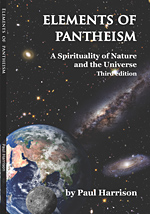What’s the relationship between World Pantheism and Unitarian
Universalism?
The two organizations overlap and complement
each other. Many
Unitarian Universalists, including ministers, are WPM members. WPM
members who belong to UU churches in some cases run courses, services or
regular groups on pantheism/nature-reverence/simple living.
What are the affinities?
World Pantheism endorses all of the UU’s seven
principles and expands on some of them. Most pantheists would draw some
elements from one or more of the world’s religious traditions. Among
these we would have a closer affinity for classical Stoicism and
philosophical Taoism, as well as for modern atheism, humanism and
environmentalism. We respect and learn from Zen Buddhism and related
schools (in their meditation and mindfulness practices more than their
metaphysics). We would find less of interest in the Western theist
traditions in their traditional forms – though we recognize that there
are valuable passages of real-life wisdom in both the Old and New
Testaments.
World Pantheism is committed to religious freedom, separation of
church and state, and religious tolerance. We filed a friend-of-court
brief in the recent US Supreme Court case opposing the "under God"
wording in the Pledge.
World Pantheism is socially and environmentally active. Human and
animal rights are important to us, based on the equality of all
conscious beings as centers of awareness. We have collected more
signatures for UNESCO’s Manifesto for Peace and Non-Violence than any
other US voluntary organization.
We endorse and expand on the UU seventh principle and we make
active care for the environment a central part of our approach. We are
by far the largest religious group saving rainforest at
EcologyFund, and we will very soon have saved the largest
amount of wildlife habitat (we started later and had some
catching up to do.)
What’s the difference between World Pantheism and Unitarian
Universalism?
Essentially, Unitarian Universalism has shared values
such as tolerance and justice, but does not take up any particular
religious or metaphysical viewpoint, for example on the truth of any
scripture, the existence of a creator, personal God, of souls separate
from bodies, or of a personal afterlife.
World Pantheism does promote a few basic religious/metaphysical
beliefs, such as:
● Nature and the Universe are the most appropriate focus for our
deepest spiritual feelings of belonging and reverence.
● Everything that exists is a part of Nature.
● Mind and body are an inseparable unity.
● Although sceptical about personal survival after death, we look
forward to a "natural" afterlife in terms of the actions and creations
we leave behind, our families, the memories people hold of us, and the
recycling of our elements in nature.
So why be both a UU and a World Pantheist?
Unitarian Universalism is a context where it is possible to meet
intelligent sociable tolerant people with differing religious
philosophies for shared spiritual exploration, social action and
interaction, and community support.
World Pantheism is a religious orientation in the same sense that
atheism, Christianity or Judaism are. It is a position about our place
in Nature and the Universe. Many people need both a social context AND a
belief context in order to feel comfortable with their place in society
and the universe. There are are pantheist Unitarian Universalists, just
as there are pagan, Humanist, Christian, or Jewish Unitarian
Universalists. World Pantheism also offers written materials, networking
and social/environmental action among pantheists.
A growing number of UU fellowships have pantheist, nature-reverence
or sustainable living groups where members can:
● share
experiences, discoveries and life wisdom
● make outings to natural
areas, exhibitions, recycling centers, "green" buildings and so on
● discuss the ideas of
sustainability and nature-reverence.
What’s the difference between World Pantheism, atheism and humanism?
Atheism simply makes the statement that there is no
creator God, no personal God, no judging God. Beyond that atheists can
be nature-lovers or nature-haters, they can see life and the Universe as
joyful or absurd.
Most people look for more than just a negative from a religious
philosophy. Recognizing this, Humanism has added statements of ethics
and principles.
World Pantheism goes one step further and recognizes that most
people feel a need for something that is greater than themselves and
greater than the human race. In our case that greater whole is nature on
this earth, and on a wider scale the entire universe or Multiverse of
all that exists. We also promote a joyful and positive approach to life.
World Pantheism has many members who would also describe
themselves as atheists and/or humanists, but to these positions they add
a profound and satisfying spiritual (emotional and aesthetic) dimension
in their connection with nature, the universe, and their fellow humans.
What’s the difference between World Pantheism and paganism?
World Pantheism itself celebrates the major
astronomical transitions of the year. It has no prescribed ceremonies:
people and groups choose their own style. We have many members who
also consider themselves as pagans and who may observe pagan ceremonies
and seasons.
However, most World Pantheist pagans view pagan deities, spirits
and magic as symbolic expressions rather than literal truths, or they
may observe the main festivals in ceremonies of their own devising. As
one member put it "Nature is supernatural enough." We tend to focus more
intently on the wonder of nature and the night sky. Symbolic forms are
fine if we make sure they don’t obscure the direct view of these
realities.
Contacts and links
|





